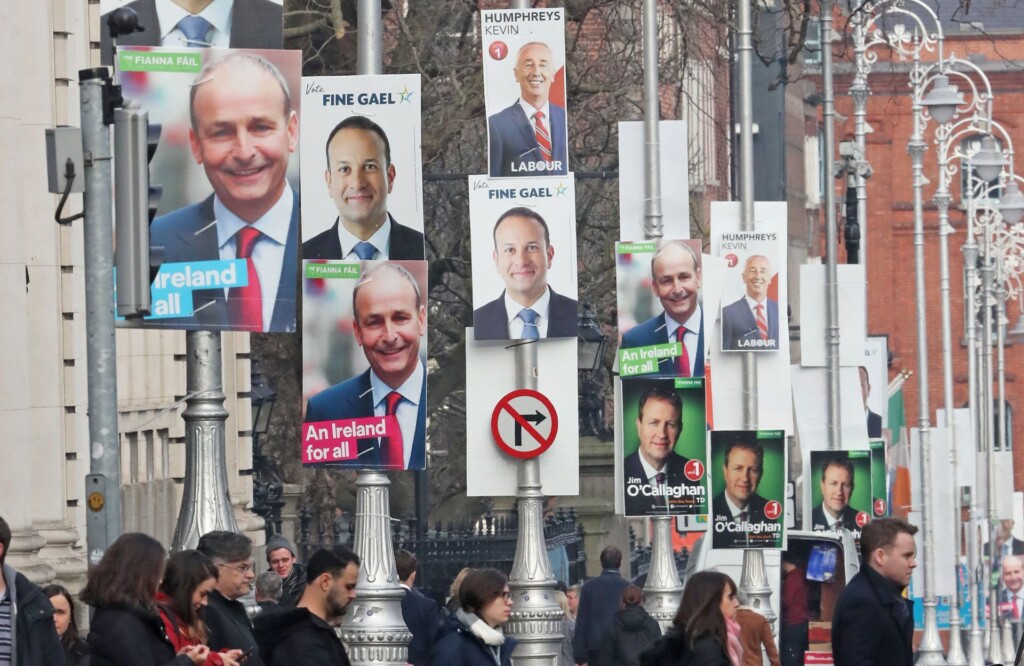There are many fixtures of election season in Ireland; photo ops, press releases, meeting voters on the doorstep, but perhaps the most cherished election season minutia is candidate posters.
Green Party Councillor David Healy proposed a motion at this month’s meeting of Fingal County Council that calls on Government to implement designated postering areas for elections.
The motion notes that the practice is already in place in other European nations, and that Ireland should bring in the practice.
“We have a long-standing wish amongst our communities to be spared the blight of posters all over our landscape,” he told the meeting.
“We have concrete examples from Europe where there are organised postering facilities, where locations within towns and neighbourhoods are marked as places where posters are put up.”
Nolan referred to the Programme for Government where the Electoral Commission was tasked by the Government to “examine the issue of the use of posters at elections and referendums within 12 months of its establishment and consult on placing limitations on the number of posters that can be used or fixing certain locations for their use.”
With elections set for June, Nolan called on Fingal County Council to back the motion and send it to the Department of Housing, which was agreed by 13 votes to 10.
Politicians from across the political spectrum had different views on the issue, with Labour Councillor Brian McDonagh said he “fundamentally disagrees” with the notion of posters only being allowed up in designated areas.
“There is no question where there are times where postering is excessive, but we must be careful not to throw out the advantages that comes with postering.”
McDonagh noted that there is a strong advantage among sitting elected representatives, but it was more difficult for first-time candidates.
“There is a unique situation with relation to postering and I think that some of the advantages outweigh the disadvantages.”
McDonagh’s Labour colleague John Walsh said he slightly disagreed with his party members, and said that posters “are my least favourite part of campaigning.”
“There is no doubt that postering is out of control in part of Dublin 15 – Blanchardstown Village, which is crazily the boundary between two electoral areas, could have posters for 25 candidates.”
Walsh alluded to a candidate that stood in his area that “put up more posters than he got votes,” and said he would support the restriction of posters in an area over time.
Sinn Féin Councillor Angela Donnelly disagreed with the motion and voted against it, saying “people wouldn’t even know there was an election on if it weren’t for posters.”
While acknowledging that voter turnout in Ireland could be better, Donnelly said turnout would drop if posters were restricted.
Fianna Fáil Councillor Darragh Butler said “it is easy for me to say this as an incumbent, but the one part of elections I hate is the postering; they are a liability insurance wise and in this day and age there are loads of other ways to let people know about the candidates in their area.”
Butler’s colleague Howard Mahoney agreed, saying that “people are getting cynical” with regards to candidate posters.
“It’s our job to let people know there’s an election on, such as leafleting, canvassing, meeting voters at shops, and you can do that without polluting the environment.”
Fine Gael’s James Humphreys asserted that first-time candidates “definitely do” need posters, and cited the 1999 local elections where the practice of restricting posters was implemented in certain wards across Ireland.
In that case, turnout was down.
Humphrey’s fellow Fine Gael colleague Punam Rane said “as a first time candidate in 2019, it was important I had posters out there; no one would have known who I was unless I was a celebrity.”
